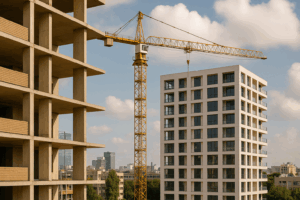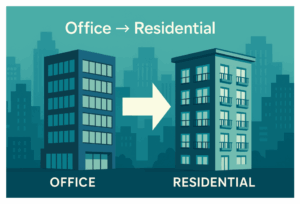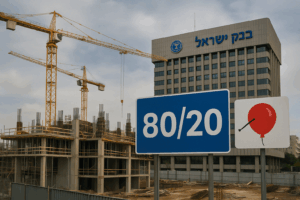The Role of “TAMA 38” in Urban Renewal
“TAMA 38” is a national outline plan in
Israel aimed at strengthening existing buildings against earthquakes. However, its
impact goes beyond just safety improvements. Implemented in the early 2000s, TAMA 38 offers incentives to property owners and developers to renovate old buildings, providing additional floors or units in return for seismic upgrades. This initiative has transformed urban landscapes, revitalizing aging neighborhoods and increasing property values. It represents a unique approach to urban renewal, blending safety with
development incentives, and has become a key factor in the Israeli
real estate market. Through TAMA 38, buildings not only become safer but also more valuable, offering benefits to homeowners,
investors, and the broader community.
Technological Innovation in Construction
Israel’s real estate market is at the forefront of integrating technology into construction, significantly impacting efficiency and sustainability. From smart homes equipped with IoT devices for enhanced living experiences to green buildings designed for environmental sustainability, technology is reshaping the construction landscape. Companies are using advanced materials and methods, such as 3D printing and modular construction, to speed up the building process and reduce costs. These innovations not only cater to the growing demand for modern and sustainable living spaces but also position Israel as a leader in construction technology.
Impact of High-Tech Industry on Real Estate
The booming high-tech sector in Israel, dubbed “Silicon Wadi,” significantly influences the real estate market. High-tech companies require
office spaces, R&D facilities, and employee housing, driving demand in both
commercial and
residential sectors. Cities like
Tel Aviv, Herzliya, and Haifa have seen real estate prices soar as they become tech hubs. The high-tech industry’s growth contributes to an influx of skilled workers and foreign
investment, further stimulating the real estate market. This synergy between the high-tech sector and real estate development underscores the dynamic nature of Israel’s economy and its impact on urban landscapes.
Challenges and Solutions in Housing Affordability
Housing affordability remains a significant challenge in Israel, with prices rising steadily over the years. The demand for housing outstrips supply, exacerbated by limited land availability and bureaucratic hurdles in the planning and construction process. To address these issues, the government has implemented measures such as increasing the supply of land for construction, offering subsidies for first-time homebuyers, and promoting public housing projects. Despite these efforts, finding affordable housing solutions remains a complex task, requiring a multifaceted approach that balances market demands with social equity.
Conclusion
The real estate market in Israel is a dynamic and complex field, influenced by a range of factors from government policies to the high-tech industry’s growth. While challenges such as housing affordability persist, innovations in construction technology and urban renewal initiatives like TAMA 38 offer pathways to addressing these issues. As the market continues to evolve, staying informed and
understanding the underlying trends will be crucial for anyone looking to navigate the Israeli real estate landscape successfully.
FAQs
What drives the high demand for real estate in Israel?
The high demand is primarily due to the country’s strong economy, population growth, and the influx of foreign investment, particularly in the high-tech sector.
How does the government support affordable housing?
The Israeli government employs various strategies, including providing subsidies for first-time homebuyers, increasing the supply of land for construction, and promoting public housing projects.
What is the impact of the high-tech industry on real estate prices?
The high-tech industry’s expansion has led to increased demand for office spaces and housing for employees, contributing to rising real estate prices, especially in tech hubs like Tel Aviv.
Can foreign investors own real estate in Israel?
Yes, foreign investors can own property in Israel, although there are certain restrictions and regulations they must navigate, including understanding the implications of purchasing land leased from the Israel Land Authority.




